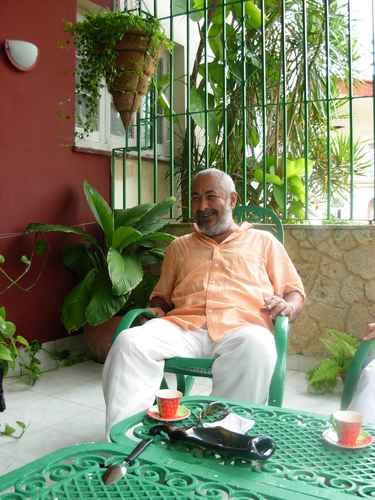
Necesitamos, mucho, un mundo con mayor equidadFoto Gerardo Arreola
Domingo 13 de septiembre de 2009, p. 2
La Habana, 12 de septiembre. Ramón Mercader
fue un creyente que se convirtió en fanático y luego
en asesino, siempre por la fe
, dice el
escritor cubano Leonardo Padura, quien acaba de
publicar su novela El hombre que amaba a los
perros (Tusquets), cimentada en ese personaje,
esencia de lo más tétrico del estalinismo
.
La saga de novelas policiacas, donde el inspector Mario Conde rastrea a la Cuba contemporánea, está traducida a 16 idiomas y le ha dado a Padura (La Habana, 1955) tres veces el Premio Dashiell Hammet de Novela Negra, entre otros reconocimientos.
Ahora, el autor penetra en la vida y la mente del asesino de Trotsky, en una reconstrucción en la que obligadamente vienen a escena la madre del homicida, la alucinante Caridad Mercader; la guerra civil española, y, por supuesto, el puño de hierro de Stalin. La novela empieza a circular este mes en España y llegará a México en noviembre.
Padura, uno de los autores cubanos contemporáneos más leídos dentro y fuera de la isla, dice a La Jornada que uno de sus personajes siente compasión por Mercader, por creer que fue manipulado.
Pero el escritor cree que no hay perdón posible. “Siempre queda un resquicio para la ética, para la justicia, para la dignidad; Mercader entregó todo sin demasiados remordimientos ni dudas. Quiso que lo utilizaran y ese deseo lo convirtió en un asesino capaz de cometer un crimen deleznable. Mercader y sus mentores –subimos por esa línea hasta Stalin– no merecen compasión, pues también nos manipularon a ti y a mí y a todos los que alguna vez creímos en la justicia de un proyecto social.”
Hallazgos
insultantes, dolorosos
Hace cinco años,
Padura comenzó la búsqueda maratónica de información
sobre el caso. Absorbió miles de páginas, habló con
cientos de personas y visitó decenas de lugares,
incluyendo Moscú. Ha sido una investigación
dolorosa, reveladora, insultante, que me permitió
conocer más a fondo una historia que, en casi todos
sus detalles y consecuencias, todavía hoy sigue
bastante oculta.
–En un asunto tan estudiado y discutido, ¿había algo por descubrir?
–No creo que el asunto haya sido tan estudiado ni discutido: el estalinismo y sus efectos siguen siendo fuente inagotable de revelación de horrores, una historia amarga de la que no sabemos cuándo lo sabremos todo. En la vida de Mercader, en aspectos como la conversión de un revolucionario español en un asesino político, o en su vida en Cuba (1974-1978), había mucho por descubrir y todavía queda mucho por conocer. El manto de silencio que envolvió todo eso es más denso de lo que podemos imaginar.
–Entró al corazón de la gran utopía igualitaria del siglo XX. ¿Cómo ve esa utopía después de escribir esta novela?
–La sigo viendo como una exigencia de la sociedad humana. Necesitamos, mucho, un mundo con mayor equidad, verdadero respeto por el individuo y sus libertades, con una democracia real y efectiva (la democracia de la mayoría), con menos miseria y más justicia y, sobre todo, sin miedo. Pero de esas ideas a la práctica soviética hubo una gran distancia, y lo ocurrido allí durante seis décadas fue una de las perversiones más lamentables de la esperanza humana, uno de los engaños colectivos más desastrosos, uno de los fraudes históricos más catastróficos que ha sufrido el hombre y veo esa utopía traicionada, como una de las mayores traiciones cometidas contra los sueños y las necesidades de la humanidad.
–No sé si será un tabú, pero es un asunto alrededor del cual hay gran desconocimiento, falta de información e incluso hay pasiones e historias nunca resueltas. Sobre el lado oscuro de Stalin (más grande de lo que cualquiera se imagina) no se habló ni se escribió en largos años, y Trotsky sólo fue visto como el traidor renegado, y muy poco se ha hecho para recolocarlo en el ajedrez de las luchas políticas soviéticas.
Cómo sería una verdadera sociedad socialista
Hoy,
lentamente, las cosas cambian y los juicios se
matizan, pero sin demasiado énfasis, a pesar de que
toda esa historia es también en parte nuestra, desde
que Cuba asumió el modelo socialista soviético.
Desde los años 90 del siglo pasado y hasta hoy, la
sociedad cubana ha cambiado mucho, respecto de estos
y otros temas, y aunque no se discutan ciertas
evidencias, hay una conciencia mayor de la verdad
histórica. Como siempre he creído que la literatura
es también fuente de conocimiento de la realidad,
pues confío en que mi novela dé mayor capacidad de
juicio a quienes la lean.
–Reabrir el expediente del estalinismo puede decir algo a quienes eran adultos el siglo pasado. ¿Le dice algo a los más jóvenes?
–Si no les dice nada es porque nada les diría nada. El gran problema es que todavía hoy nadie ha dicho cómo sería una nueva y verdadera sociedad socialista, a salvo de una perversión estalinista, un estalinismo que quizás no tendría que llegar al horror de los crímenes masivos, pero que podría pervertir algunos de los principios básicos de esa equidad real y democracia efectiva que debe acompañar a la soñada y necesaria sociedad de los iguales.
Aprender del pasado es la
única manera de mejorar el futuro, y si hay jóvenes
que desean esa mejoría, el estudio del estalinismo y
sus traiciones, los modos en que Stalin pervirtió
las ideas y las condiciones que le permitieron
hacerlo, es una asignatura básica. Espero que les
diga algo, por el propio bien de esos jóvenes y del
futuro de todos.
